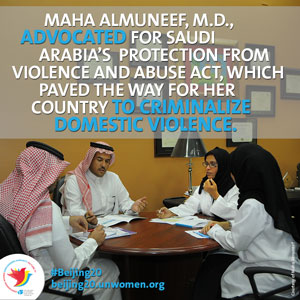Maha Almuneef - Breaking stereotypes, reaching goals
Date:

As Executive Director of NFSP, she focuses her attention on prevention programmes and training of professionals, such as police or lawyers, in improving support for survivors of violence. The NFSP also provides counselling and referral services, and manages the Saudi Child Helpline dedicated to delivering counselling for children, who have been subjected to abuse, and their caregivers. Advocating for the recently-adopted “Protection from Abuse” law that criminalizes domestic violence was Maha’s passion project. She received a prestigious award from President Barack Obama this year, making her a strong role model for the women of her country.
Maha stood against cultural taboos in forming and leading her own organization, overcame criticism, harassment and other difficulties to pursue her goal of achieving equality for both women and men in Saudi Arabia. She has broken stereotypes and shattered walls, making a tangible change in the way people perceive domestic violence. She acts as a role model, proving that women can be hardworking, successful leaders, as well as wives and mothers.
What do you think have been the most important factors that have helped you get where you are today?
Courage and working hard! Being born and raised in Saudi Arabia makes me close to my community, being a woman with a scientific background and integrity gives me the trust of people and my society.
What were some of the biggest obstacles you faced in reaching where you are today?
One of the major challenges that anyone who works in the field of domestic violence will face is culture. Domestic violence is a sensitive subject, and more so in the eyes of a conservative society that is not used to women voicing their opinions so loudly, so I faced some opposition. The lack of laws against domestic violence and child maltreatment makes advocacy and provision of services to victims more challenging.
How do you cope being one of the few women in your area of work?
Being a graduate from an Ivy League university and looking at myself as a professional expert regardless of my gender has helped a lot.
What do you believe is your greatest contribution to society?
I established a national programme that addresses the issue of domestic violence at all levels. My contribution towards the approval of the “Protection from Abuse” law by the Ministerial Cabinet makes Saudi Arabia one of few Arab countries that has a law criminalizing domestic violence.
What is your message for other women and girls who may be inspired by your journey and achievements?
To believe in themselves. They can make change by speaking up for their rights. They must understand that change may take time, but with dedication and hard work, everything is possible. Love what you are doing, be passionate about it, dream high, and do not underestimate your potential.